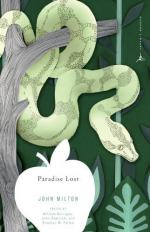|
This section contains 318 words (approx. 1 page at 400 words per page) |

|
Paradise Lost Summary & Study Guide Description
Paradise Lost Summary & Study Guide includes comprehensive information and analysis to help you understand the book. This study guide contains the following sections:
This detailed literature summary also contains Further Study and a Free Quiz on Paradise Lost by John Milton.
Paradise Lost, one of the greatest poems in the English language, was first published in 1667. Milton had long cherished the ambition to write the definitive English epic, to do for the English language what Homer and Virgil had done for Greek and Latin, and what Dante had done for Italian. He had originally planned to base his epic on the Arthurian legends, which were the foundational myths for English nationalism, but later turned his attention to more universal questions. He decided to focus on the foundational myth of humanity itself, the Genesis account of creation and fall. It was an ambitious project, for Milton was determined to attempt "things unattempted yet in Prose or Rhyme," and his success is indicated by the esteem in which the poem is held to this day.
Milton's epic poem received mixed reactions in the seventeenth century, and, over the years, has continued to arouse both praise and blame. Yet, its admirers have always been more numerous that its detractors. The poem has influenced many authors and artists, from John Dryden to William Blake, Mary Shelley to Philip K. Dick, C. S. Lewis to Gene Roddenberry. Aside from the sheer beauty of its language and the power of its characterization, the subject matter of the poem has continued to absorb readers of every generation. Milton does not hesitate to ask the most difficult of questions: If the world was created by a good, just, and loving God, why is there little evidence of goodness and justice in the world? What does it mean for humankind to be created in the image of that God, and how does humanity endure in a fallen world? It is this aspect of the poem which will continue to enthral readers, as they continue to ask the same difficult questions and turn for answers to Milton's exploration of one of the foundational myths of Western culture.
Read more from the Study Guide
|
This section contains 318 words (approx. 1 page at 400 words per page) |

|



